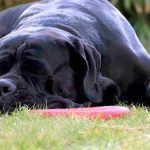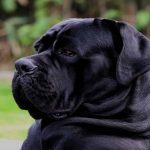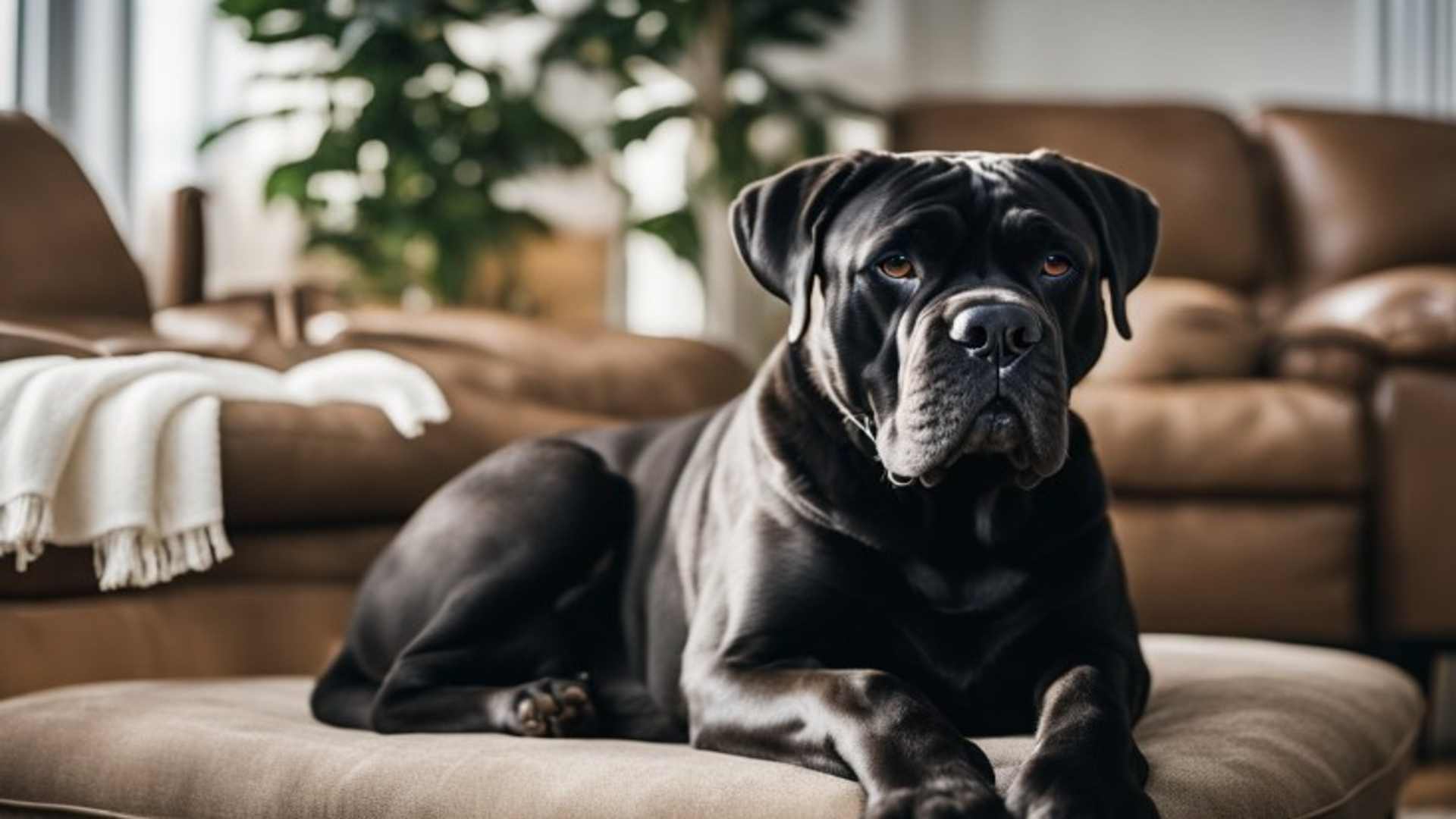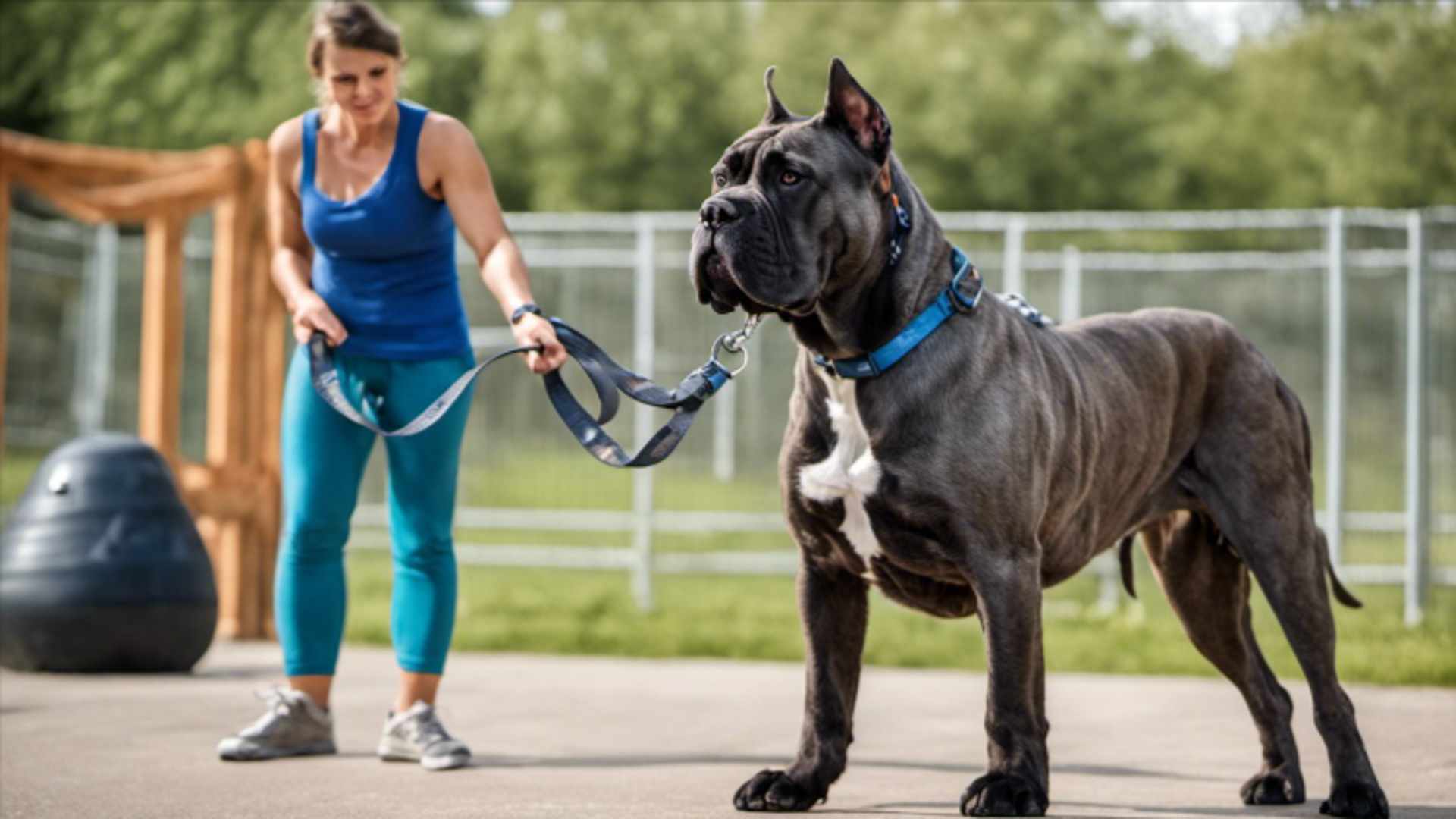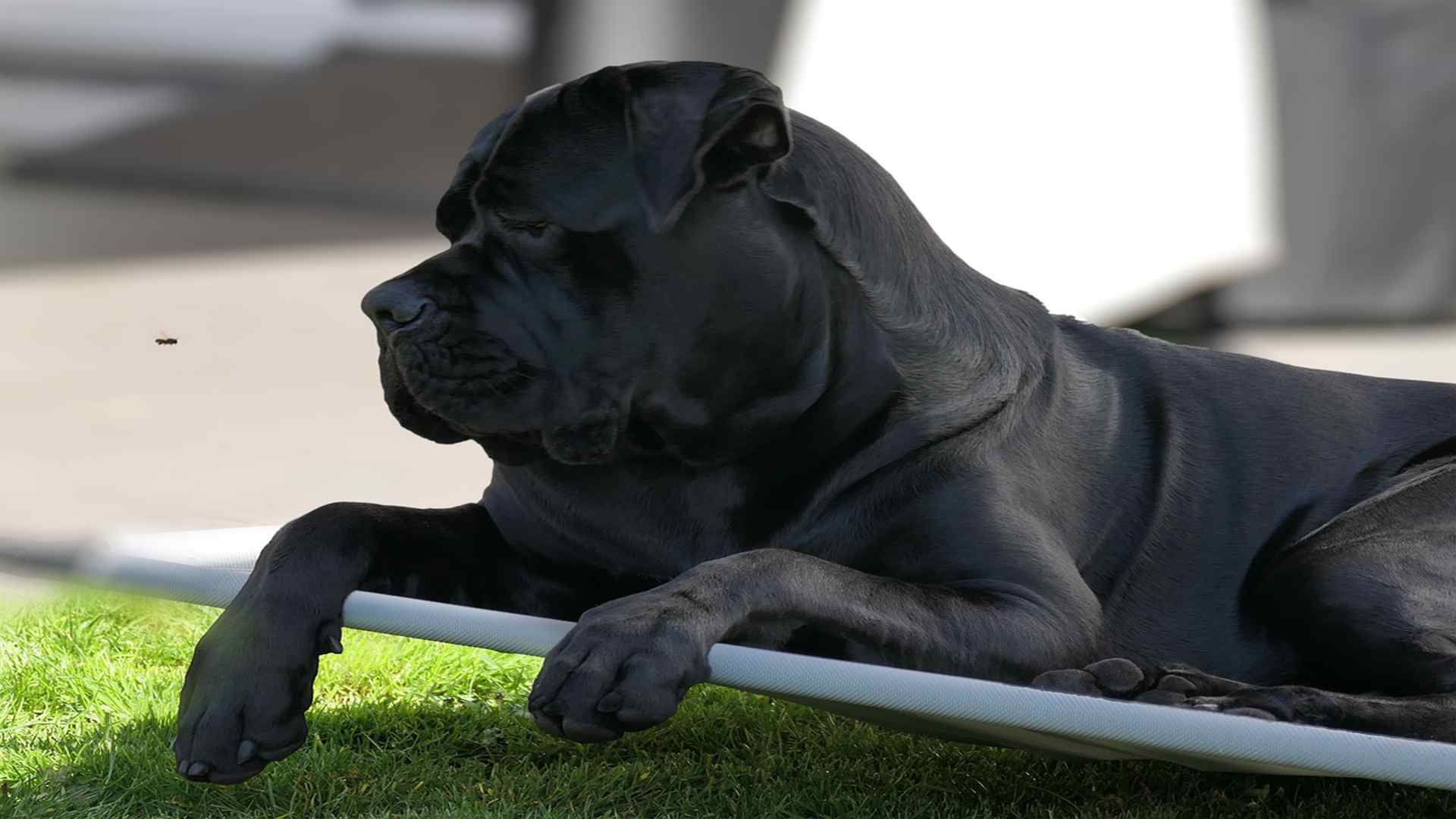Do you have a Cane Corso and find yourself constantly wiping up drool from your floors, furniture, and clothes? You’re not alone! Although drooling is a normal part of a cane Corso’s physiology, it can sometimes get out of control and become a nuisance for owners.
In my experience, there are several effective methods to help reduce and manage drooling in these beautiful animals. Over the years, my cousin and I have tried a few of them with good success.
Let’s dive into some of these techniques which can help manage your cane Corso’s drooling.
Understanding Cane Corso drooling
First and foremost, it’s essential to understand why your cane Corso is drooling in the first place. This breed has been bred for centuries to be guardians and hunters.
This means they have an inherent instinct to produce a protective slobber that can ward off predators or potential prey.
So, while drooling is a normal and natural part of their physiology, excessive salivation can happen due to certain triggers like excitement, anxiety, or fear. Some of these reactions are hard-wired into their brains and can be difficult to control.
Anatomy of Cane Corso jowls
I’ve had plenty of occasions to observe my cousin’s dog’s drooling habits. One of the reasons why a Cane Corso drools are due to the anatomy of their jowls.
This large breed dog has prominent jowls that can hold a lot of saliva, which can easily spill out when they’re panting or excited.
The loose skin around their mouths can also trap saliva, making it look like they’re drooling more than they actually are.
Saliva production
Cane Corsos produce a large amount of saliva, which is essential for the digestive process and helps with chewing food.
Saliva production may increase for various reasons, like anticipation of food, excitement, or even stress.
This excess saliva can cause drooling, especially when the dog is in a position where it’s harder to swallow, like lying down or resting its head on a surface.
Characteristics of Mastiff-Type dogs
Cane Corso is a type of mastiff breed that shares certain characteristics with other large-breed dogs.
These dogs have large heads, strong jaws, and thick, muscular bodies. Due to their size and powerful build, they may drool more than smaller breeds.
Common causes of drooling in Cane Corsos
There are many potential causes of drooling in Cane Corsos, but the most common ones include:
1. Health issues
In my experience, some health issues can cause drooling in Cane Corsos. Infections, for example, may lead to excessive drooling if they affect the mouth, throat, or respiratory system.
Another health issue to keep an eye on is heatstroke, as overheating can cause drooling and is dangerous for dogs. Motion sickness and nausea can also lead to drooling due to discomfort.
2. Dental problems
I’ve noticed that dental issues, such as tooth decay or gum disease, can cause drooling in Cane Corsos.
If your canine friend is drooling more than usual, inspect their mouth for visible signs of dental problems like swollen gums or broken teeth.
Also, a foreign object lodged in their mouth or throat could cause drooling and should be carefully removed to avoid choking.
- Tooth decay. It can cause pain and drooling.
- Gum disease. Swollen, red gums can lead to drooling.
3. Environmental factors
Environmental factors play a significant role in your Cane Corso’s drooling. When the environment changes or becomes unfamiliar, stress may cause your dog to drool.
This is especially true if your Cane Corso suffers from separation anxiety, which can lead to additional stress when left alone.
Be aware of any unusual environmental changes that might be causing your dog to stress and drool.
| Factor | Possible Cause of Drooling |
|---|---|
| Unfamiliarity | Stress |
| High temperature | Overheating |
4. Emotional triggers
Your dog’s emotional state might be the cause of their drooling. Fear, anxiety, and nervousness can all lead to drooling due to the stress they cause.
Stress may increase in certain situations, such as meeting new people, going to the vet, or experiencing travel. In contrast, excitement may also cause drooling in your Cane Corso, especially during playtime or when anticipating a treat.
- Fear. New experiences or surroundings can cause fear and subsequent drooling.
- Anxiety. Situations like vet visits can cause anxiety and drooling.
- Excitement. Playtime or anticipating a treat can cause excitement-induced drooling.
Identifying and addressing underlying health issues
Now that we know the most common causes of drooling in Cane Corsos, it’s time to address any underlying health issues and make sure your pet is healthy.
Seeking veterinary care
When my cousin Cane Corso started drooling excessively, I knew it could be a sign of an underlying health issue.
So my cousin and I decided to visit a veterinarian to determine if there was a possible health problem causing the drooling. Regular vet check-ups can help identify and address issues before they become more severe.
Read also: How to Train a Cane Corso Puppy to Stop Biting (Explained)
Diagnosing and treating infections
The veterinarian conducted a thorough examination to check for any infections. Infections in the mouth, throat, or sinuses can contribute to increased drooling.
They checked for cysts, tumors, and foreign bodies, which might be causing discomfort or obstruction. After diagnosing the issue, they prescribed appropriate treatments such as antibiotics or anti-inflammatory medications.
Preventing and managing chronic conditions
During the examination, the vet also checked for signs of chronic conditions like kidney disease, liver disease, or exposure to poisonous substances that may lead to excessive drooling.
Testing for conditions like rabies was essential as well, as it’s crucial to address life-threatening diseases promptly.
Through regular visits to the veterinarian and by following their advice, I managed to keep my cousin Cane Corso’s drooling under control.
Identifying and addressing underlying health issues plays a significant role in helping your Cane Corso maintain a healthy and comfortable life.
Cane Corso’s dental and oral health
Maintaining a good oral hygiene routine is not only good for humans but also for dogs! There are a few simple ways to ensure your dog’s oral health is in top shape.
Detecting dental problems
In my experience, Cane Corso’s drooling can sometimes be an indicator of dental problems. I can spot these issues by checking for bad breath, which is often a sign of a more serious underlying health issue.
To identify possible dental problems, I closely inspect my dog’s teeth and gums for redness, swelling, or any unusual growth.
I also pay attention to any changes in their eating habits or any signs of discomfort while chewing.
Maintaining dental hygiene
To maintain my cousin Cane Corso’s dental hygiene, I have adopted a few preventive measures:
- Brushing their teeth. I brush the dog’s teeth at least twice a week using dog-friendly toothpaste and a soft toothbrush.
- Dental chews and toys. I offer dental chews and toys designed to clean their teeth and massage their gums while being chewed.
- Regular dental checkups. I schedule veterinary dental cleanings once a year to prevent tartar build-up and detect potential issues.
Addressing underlying fears and stress
I understand that some Cane Corsos may drool excessively due to underlying fears and stress. To address this issue, I observe Rex, ( my cousin Cane Corso) closely for any changes in behavior that may indicate stress, such as excessive barking, hiding, or pacing.
When I notice these signs, I work on identifying the stressors and finding ways to minimize their impact. This might include creating a calm environment, socializing with other dogs, or working with a professional dog trainer or behaviorist.
Managing salivary glands and discomfort
Since drooling is a natural process related to the salivary glands, I learned that keeping them functioning properly will help reduce excessive drooling. Ensure to monitor your Cane Corso’s hydration levels by offering fresh water at all times and ensuring their diet is balanced.
Practical tips to minimize drooling
As a bonus tip, I have also picked up a few practical techniques to help you manage the drool.
1. Control food and water Intake
As a responsible pet owner, I make sure to monitor my cousin Cane Corso’s food and water intake. It’s essential to control the portions as well as the type of food.
Avoid giving your Cane Corso foods that are difficult to chew, or that can cause digestive upset, such as bones or table scraps.
Providing a balanced diet with proper nutrients helps minimize the production of saliva. I also pay close attention to my dog’s water intake, offering fresh water in a clean bowl but making sure not to overfill it. This tactic helps prevent messy splashes and dribbles.
Read also: How Do Cane Corsos Handle Weather Temperatures? (Complete Guide)
2. Managing Anxiety and Fear
In my experience, addressing Cane Corso’s anxiety and fear is crucial for reducing drooling. I have learned to recognize signs of discomfort in my dog, such as excessive panting, vocalization, or pacing.
When it comes to stopping Cane Corso from drooling, addressing the underlying anxiety is key. As a dog owner, it’s important to recognize signs of discomfort and fear in your Cane Corso, such as excessive panting, vocalization, or pacing.
To reduce drooling due to anxiety, I have found that building trust and creating a safe space for my cousin Cane Corso can help minimize this behavior.
3. Providing mental stimulation and exercise
I believe in the importance of mental stimulation and exercise in keeping my cousin Cane Corso happy and reducing the dog’s drooling tendencies.
Engaging in interactive games, such as tossing a ball or frisbee, helps maintain excitement and prevent boredom. I challenge this amazing dog’s mind with puzzle toys and obedience training.
Combining mental stimulation and physical exercise provides the necessary enrichment for my dog to stay content, less stressed, and less prone to drooling.
4. Discussing with Your Veterinarian
Before considering surgery for your Cane Corso’s drooling issue, consult your veterinarian. They will help you determine the most appropriate course of action based on their assessment of my dog’s condition and any underlying issues.
Summary
Before we move on to the conclusion, we’ve summarized this article into a short list of key points for you to remember:
- Drooling is a normal part of a Cane Corso’s physiology but can become excessive due to triggers like excitement, anxiety, or fear
- Cane Corsos produce a large amount of saliva, and their anatomy, including prominent jowls, can contribute to drooling
- Common causes of drooling in Cane Corsos include health issues, dental problems, environmental factors, and emotional triggers
- Preventive measures to minimize drooling include controlling food and water intake, managing anxiety and fear, providing mental stimulation and exercise, and discussing with a veterinarian before considering surgery.
Final thoughts
There you have it!
If your Cane Corso is drooling more than usual, remember to think about the common causes and practical tips outlined in this article.
Cane Corso drooling can be managed with the right care and preventive measures, so don’t forget to consult your veterinarian for further information or specialized advice.
Want to learn more about Cane Corso?
Ready to boost your knowledge to the next level? If so, check out the articles below:
- What Fruits Can Cane Corso Eat? (Ultimate Guide)
- Is Cane Corso Clingy? Everything You Need to Know!
- What Size Dog Crate for a Cane Corso? Expert Recommendations

